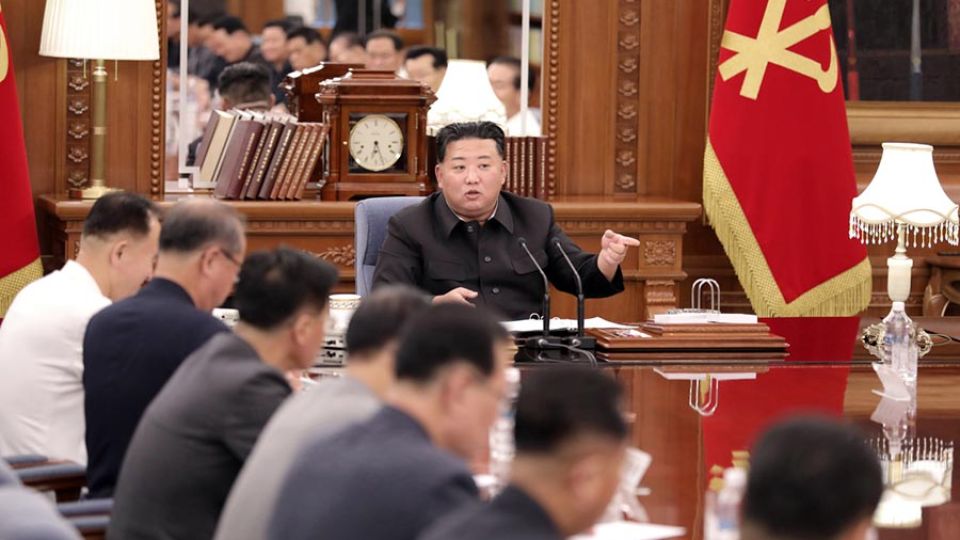June 29, 2022
SEOUL – North Korean leader Kim Jong-un convened a key party meeting to discuss how to reorganize party departments and strengthen party control over intelligence, surveillance and judicial apparatus, the state media reported on Tuesday.
Kim on Monday presided over an enlarged meeting of the Secretariat of the Central Committee of the Workers’ Party of Korea at the party headquarters in Pyongyang, the Rodong Sinmun, a party organ, said.
The secretariat discussed reorganizing some departments of the Central Committee and establishing a new system to strengthen the guidance and support to the work of the provincial party committees.
North Korean secretaries examined ways to improve and readjust ways how the ruling party’s guiding organs at all levels manage and operate their work and strengthen their political activities.
The political activities in North Korea refer to the party’s work to indoctrinate the people to make them thoroughly implement the party’s decisions.
The key party meeting also discussed improving the rules of the party’s general affairs and the “system of dealing with confidential documents” and “intensifying policy guidance on the work implemented in state and public security, judiciary and prosecution fields.”
Other agenda topics include planning party work to be carried out this year, as well as “setting up a new education system to enhance the political and practical qualifications of officials of party organizations at all levels and their ability to carry out work.”
“Comrade general secretary made an important conclusion on the duties and urgent tasks of departments of the Party Central Committee as well as the major principles to be maintained in the party-wide political activities and (related) tasks and ways to implement them,” the Rodong Sinmun said, without further details.
Follow-up meeting to party plenum
The secretariat serves as the highest executive body of the ruling Workers’ Party of Korea and is responsible for planning and guiding the party’s work. A meeting of the secretariat generally discusses and makes decisions on the party’s work and related practical issues.
Oh Gyeong-seob, a research fellow at the government-funded Korea Institute for National Unification, said one of the two main goals of the latest meeting was to devise plans to carry out tasks proposed at the party plenum held between June 8 and 10.
“The meeting of the secretariat aimed to come up with follow-up and practical measures to implement the decisions made at the enlarged plenary meeting,” Oh told The Korea Herald.
Yang Moo-jin, a professor at the University of North Korean Studies, also took note that directors of relevant departments, the first vice director of the Organization and Guidance Department and department vice directors were present at the meeting as observers.
In light of this, Yang said the meeting focused on strengthening the connection between the secretariat with the party’s specialized departments and enhancing the departments’ ability to carry out the decisions at the party plenum.
Yang said the presence of the first vice director of the Organization and Guidance Department shows that the department will spearhead large-scale censorship to establish discipline within the party.
Strengthening party control
Seoul-based experts shared the view that another implication of the meeting was that North Korean officials reviewed ways to reinforce party control over the organs surveilling and regulating society.
The Kim Jong-un regime sees the necessity to step up internal control at a juncture when it is confronted with multifaceted difficulties such as an outbreak of COVID-19.
“North Korea has concentrated on building the regime’s capabilities and maintaining stability by strengthening the party-central ruling system at a time where North Korea faces internal and external challenges and is in a tense situation,” Kim In-tae, a senior research fellow at the Institute for National Security Strategy, told The Korea Herald.
“The issues discussed at the secretariat’s meeting are basically with respect to reinforcing the party’s control over the overall system.”
In this sense, Oh pointed out that “another goal of the meeting was to discuss practical steps to bolster internal control in light of the agenda topics for discussion.”
The North Korean state media reported that North Korean secretaries discussed strengthening state control, public security and legal systems, which the Kim Jong-un regime has attached significance to.
“There appears to be growing discontent among North Korea’s elites and people at the Kim Jong-un regime as the economic situation gets considerably worse due to economic sanctions on North Korea and COVID-19 border lockdowns,” Oh said.
“In light of this, stepping up internal control has become a salient issue. And the meeting shows North Korea’s intent to strengthen control of North Korean people and elites.”
Monday’s enlarged meeting came two weeks after the North Korean leader presided over a meeting of the secretariat on June 12. Experts said the short interval between the two meetings is noteworthy.
During the recent meeting, North Korean officials in mid-June discussed ways to tighten discipline, and urged to fight against “unhealthy and unrevolutionary acts,” including bureaucratic and influence-seeking behavior from some party members.
Lim Eul-chul, a professor of North Korean studies at Kyungnam University, explained the North Korean secretaries must have discussed follow-up measures to clamp down on abuse of power and bureaucratism that could emerge during tough times.
“Given that the current situation is more severe than ever, North Korea would be aware that it is imperative to establish and tighten the party’s fundamental discipline and (urge party officials) to comply with the discipline and step up political activities in order to break through existing difficulties,” Lim said.


